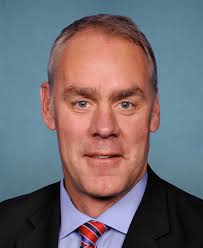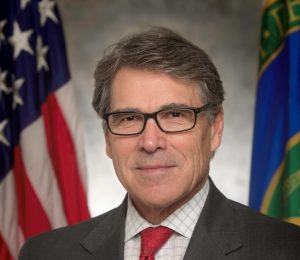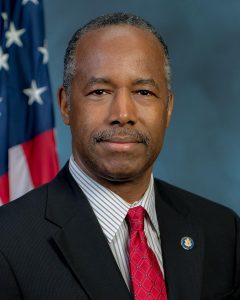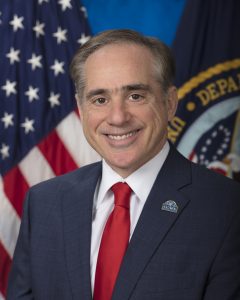Part 3: President Trump’s cabinet positions
Who has been confirmed and what will they do
As I follow the first 100 days of Donald Trump’s presidency, I will keep you up to date on the official cabinet as they are confirmed. The positions covered here are: Secretary of the Interior, Secretary of Veterans Affairs, Secretary of Energy and Secretary of Housing and Urban Development. In an effort to keep you as informed as possible, I have assembled and summarized brief biographies, political histories and the specific duties of the cabinet members.
Secretary of the Interior

Ryan Zinke served in the US Navy SEALs from 1986 to 2008, rising to the rank of commander. Zinke was the first Navy SEAL in U.S. history to be elected to the U.S. House of Representatives. Zinke holds a MBA and an MS in Global Leadership and a BS in Geology. Zinke served as the Representative for the state of Montana from January 2015 to March 2017. On his political stances, he began as a moderate Republican and slowly leaned further right. His stance on global warming shifted throughout his political career, most recently landing in 2014 stating that while it is not a hoax, he does not believe there is enough scientific proof of humans causing it. Zinke is notable for not endorsing the transfer of federal land to state control, an outlier among fellow Republicans.
As Secretary of the Interior, Zinke will be responsible for the management and conservation of federal land and natural resources. His department will oversee the Bureau of Land Management, the United States Geological Survey, the Bureau of Indian Affairs and the National Park Service.
Secretary of Energy

James Richard “Rick” Perry is best known for being Governor of Texas from 2000 to 2015, the longest-serving governor in Texas history. He ran twice for the Republican nomination for president in 2012 and 2016. In his run for the Republican nomination in 2012, Perry famously stated a desire to eliminate the Department of Energy among other departments. Perry also believes intelligent design should be taught in Texas schools, but maintains that the science curriculum should be in the hands of educators, not the governor. As of February 2015, Perry has been on the board of directors for Energy Transfer Partners, a company that owns over 60,000 miles of oil and natural gas pipelines and is in the process of constructing the Dakota Access Pipeline.
As Secretary of Energy, Rick Perry will be tasked with implementing missions critical to Trump’s goals regarding economic growth, security and environmental policy. Perry will also be tasked with maintaining the United States’ nuclear deterrent and the reduction of nuclear proliferation worldwide. Perry will be expected to oversee the United States’ energy supply, administer environmental clean-up of Cold War nuclear missions and run the department’s twenty national laboratories.
Secretary of Housing and Urban Development

Benjamin Solomon “Ben” Carson Sr. is the former Director of Pediatric Neurosurgery at Johns Hopkins Hospital in Maryland, where he worked from 1984 to 2013. Carson is a Yale graduate and has received more than 30 honorary degrees. Carson is also the recipient of the Presidential Medal of Freedom, awarded to him in 2008 by Former President George W. Bush. Carson and his wife founded the Carson Scholars Fund in 1994 to provide scholarship awards to students who displayed “academic excellence and humanitarian qualities.” The Carsons have donated more than $4.7 million toward financing the education of students entering college. Carson has never held public office, and, politically, he has shifted from Democratic to Independent to Republic – the party he ran under for the Republican Presidential nominee race in 2016. On his first day as Secretary of Housing and Urban Development, Carson made comments that seemed to equate slaves to voluntary immigrants. That same day, Carson claimed the human brain was “incapable of forgetting and could be electrically stimulated into perfect recall,” drawing heavy criticism from the scientific community. Carson stated Dec 8 that as Secretary of Housing and Urban Development he has no intention of dismantling safety-net programs for the poor and stressed the importance of education, housing and security, transportation and medical care.
As Secretary of Housing and Urban Development, Carson will oversee a number of federal programs that aid citizens with their housing needs. Carson will lead the department in finding ways to increase home ownership, support community development and increase citizens’ access to affordable housing without discrimination. Carson will administer several offices including the Federal Housing Administration, the Office of Fair Housing and Equal Opportunity, the Office of Public and Indian Housing and the Office of Community Planning and Development.
Secretary of Veterans Affairs

David Shulkin is the former undersecretary of Veterans Affairs and the first secretary to have never served in the military. Shulkin served as undersecretary under former President Barack Obama from July 2015 to February 2017. Prior to his government service, Shulkin was chief medical officer at the University of Pennsylvania Health System and served as president of Morristown Medical Center in New Jersey. Shulkin has said that shifting VA medical care to the private sector would be a “terrible mistake.” He also lists ending veteran suicide as one of the top priorities of the VA.
As Secretary of Veterans Affairs, Shulkin will oversee the health care services, benefits programs and national cemeteries. Shulkin will be in charge of the three divisions of the VA department: the Veterans Benefits Administration, the Veterans Health Administration and the National Cemetery Administration.
Also published on Medium.

